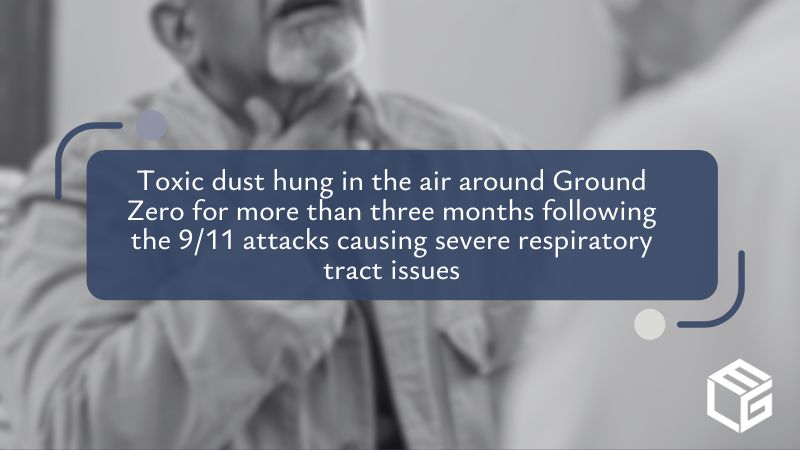-
About »
- Insulin MDL
-
Cases »
- Diseases
- Testimonials
- Government
- Contact
- Get Help Now
-

The 9/11 attacks released a toxic cloud of dust and debris into the air, exposing many responders and survivors to harmful substances like asbestos, cement dust, and jet fuel. Studies have shown exposure leads to serious respiratory problems, including upper airway hyperreactivity.
If you were present at the World Trade Center site, the Pentagon crash site, the Pennsylvania crash site, the Shanksville, or the New York City Exposure Zone during or after the attacks, and you've since been diagnosed with upper airways hyperreactivity, you may be eligible for compensation.
Claim ApplicationUpper airway hypersensitivity, also known as cough hypersensitivity syndrome (CHS), occurs when the sensory nerves in your airways become overly sensitive. This can trigger an excessive and distressing cough response to even minor environmental stimuli. A study has shown a strong link between the 9/11 toxic dust cloud and respiratory issues like upper airway hypersensitivity. Common symptoms include:
If you're a 9/11 responder or survivor experiencing these symptoms, you should seek medical attention.
The 9/11 Victim Compensation Fund considers both your economic losses (like medical expenses) and non-economic losses (like pain and suffering) when determining your compensation. However, any previous compensation you've received for your injury will be deducted from the total.
While the maximum compensation for 9/11-related respiratory conditions, including upper airway hypersensitivity, can reach up to $90,000, the actual amount you receive will depend on the severity of your condition.
Our experienced legal team has a proven track record of 30 years of success in helping individuals harmed by toxic exposure. To check your eligibility for compensation, we'll need to review your medical records confirming your upper airway hypersensitivity diagnosis and documentation of your presence in the Exposure Zone. Once we confirm your eligibility, we'll work tirelessly to secure the maximum compensation. Contact us today for a free consultation.